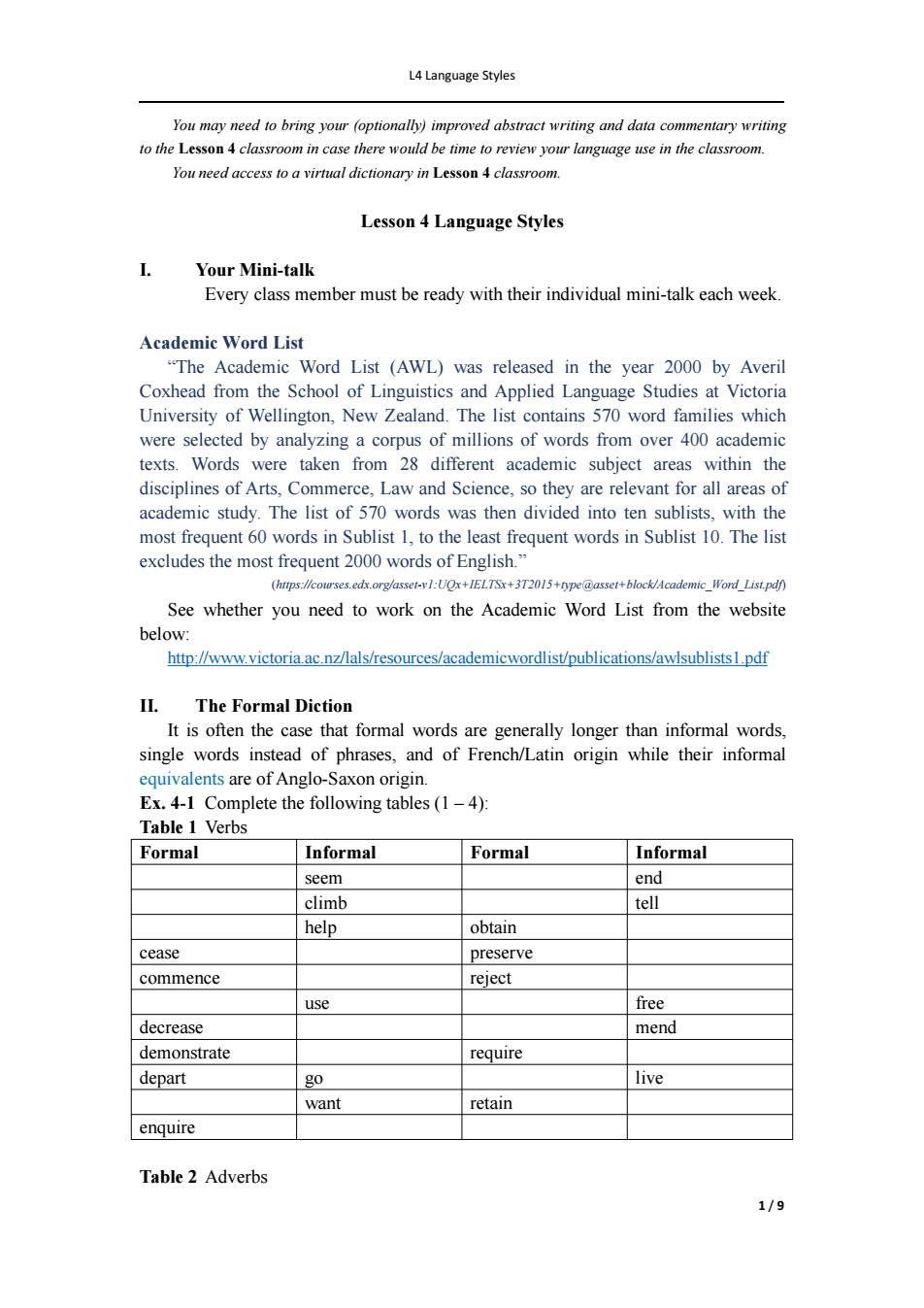
L4 Language Styles You may need to bring your (optionally)improved abstract writing and data commentary writing to the Lesson 4 classroom in case there would be time to review your language use in the classroom. You need access to a virtual dictionary in Lesson 4 classroom. Lesson 4 Language Styles Your Mini-talk Every class member must be ready with their individual mini-talk each week. Academic Word List "The Academic Word List (AWL)was released in the year 2000 by Averil Coxhead from the School of Linguistics and Applied Language Studies at Victoria University of Wellington,New Zealand.The list contains 570 word families which were selected by analyzing a corpus of millions of words from over 400 academic texts.Words were taken from 28 different academic subject areas within the disciplines of Arts,Commerce,Law and Science,so they are relevant for all areas of academic study.The list of 570 words was then divided into ten sublists,with the most frequent 60 words in Sublist 1,to the least frequent words in Sublist 10.The list excludes the most frequent 2000 words of English." (https://courses.edx.org/asset-v1:UQx+IELTSx+3T2015+type@asset+block/Academic_Word List.pdf) See whether you need to work on the Academic Word List from the website below: http://www.victoria.ac.nz/lals/resources/academicwordlist/publications/awlsublists1.pdf II.The Formal Diction It is often the case that formal words are generally longer than informal words, single words instead of phrases,and of French/Latin origin while their informal equivalents are of Anglo-Saxon origin. Ex.4-1 Complete the following tables(1-4): Table 1 Verbs Formal Informal Formal Informal seem end climb tell help obtain cease preserve commence reject use free decrease mend demonstrate require depart go live want retain enquire Table 2 Adverbs 1/9
L4 Language Styles 1 / 9 You may need to bring your (optionally) improved abstract writing and data commentary writing to the Lesson 4 classroom in case there would be time to review your language use in the classroom. You need access to a virtual dictionary in Lesson 4 classroom. Lesson 4 Language Styles I. Your Mini-talk Every class member must be ready with their individual mini-talk each week. Academic Word List “The Academic Word List (AWL) was released in the year 2000 by Averil Coxhead from the School of Linguistics and Applied Language Studies at Victoria University of Wellington, New Zealand. The list contains 570 word families which were selected by analyzing a corpus of millions of words from over 400 academic texts. Words were taken from 28 different academic subject areas within the disciplines of Arts, Commerce, Law and Science, so they are relevant for all areas of academic study. The list of 570 words was then divided into ten sublists, with the most frequent 60 words in Sublist 1, to the least frequent words in Sublist 10. The list excludes the most frequent 2000 words of English.” (https://courses.edx.org/asset-v1:UQx+IELTSx+3T2015+type@asset+block/Academic_Word_List.pdf) See whether you need to work on the Academic Word List from the website below: http://www.victoria.ac.nz/lals/resources/academicwordlist/publications/awlsublists1.pdf II. The Formal Diction It is often the case that formal words are generally longer than informal words, single words instead of phrases, and of French/Latin origin while their informal equivalents are of Anglo-Saxon origin. Ex. 4-1 Complete the following tables (1 – 4): Table 1 Verbs Formal Informal Formal Informal seem end climb tell help obtain cease preserve commence reject use free decrease mend demonstrate require depart go live want retain enquire Table 2 Adverbs
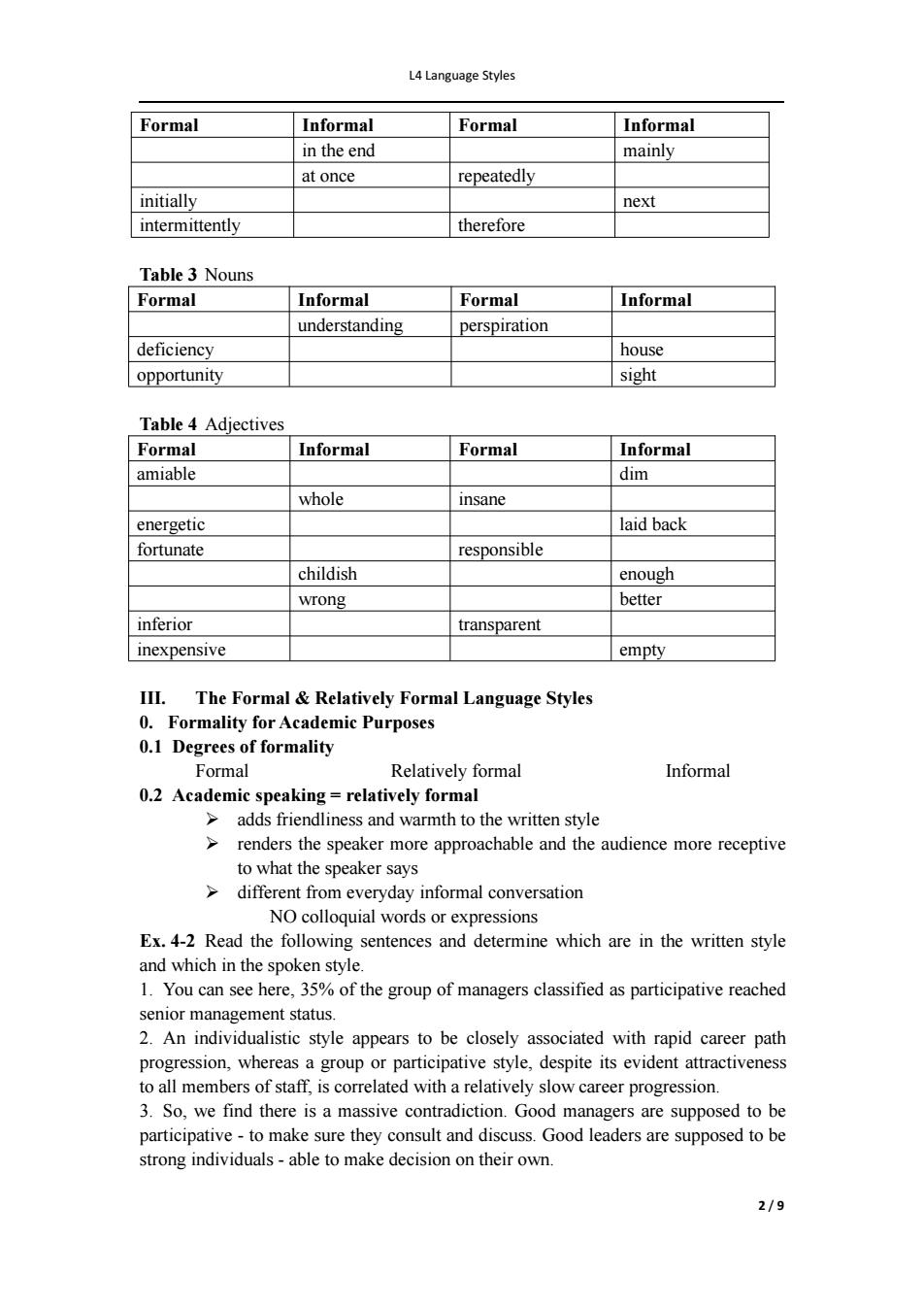
L4 Language Styles Formal Informal Formal Informal in the end mainly at once repeatedly initially next intermittently therefore Table 3 Nouns Formal Informal Formal Informal understanding perspiration deficiency house opportunity sight Table 4 Adjectives Formal Informal Formal Informal amiable dim whole insane energetic laid back fortunate responsible childish enough wrong better inferior transparent inexpensive empty III.The Formal Relatively Formal Language Styles 0.Formality for Academic Purposes 0.1 Degrees of formality Formal Relatively formal Informal 0.2 Academic speaking relatively formal adds friendliness and warmth to the written style renders the speaker more approachable and the audience more receptive to what the speaker says different from everyday informal conversation NO colloquial words or expressions Ex.4-2 Read the following sentences and determine which are in the written style and which in the spoken style. 1.You can see here,35%of the group of managers classified as participative reached senior management status. 2.An individualistic style appears to be closely associated with rapid career path progression,whereas a group or participative style,despite its evident attractiveness to all members of staff,is correlated with a relatively slow career progression. 3.So,we find there is a massive contradiction.Good managers are supposed to be participative-to make sure they consult and discuss.Good leaders are supposed to be strong individuals-able to make decision on their own. 2/9
L4 Language Styles 2 / 9 Formal Informal Formal Informal in the end mainly at once repeatedly initially next intermittently therefore Table 3 Nouns Formal Informal Formal Informal understanding perspiration deficiency house opportunity sight Table 4 Adjectives Formal Informal Formal Informal amiable dim whole insane energetic laid back fortunate responsible childish enough wrong better inferior transparent inexpensive empty III. The Formal & Relatively Formal Language Styles 0. Formality for Academic Purposes 0.1 Degrees of formality Formal Relatively formal Informal 0.2 Academic speaking = relatively formal adds friendliness and warmth to the written style renders the speaker more approachable and the audience more receptive to what the speaker says different from everyday informal conversation NO colloquial words or expressions Ex. 4-2 Read the following sentences and determine which are in the written style and which in the spoken style. 1. You can see here, 35% of the group of managers classified as participative reached senior management status. 2. An individualistic style appears to be closely associated with rapid career path progression, whereas a group or participative style, despite its evident attractiveness to all members of staff, is correlated with a relatively slow career progression. 3. So, we find there is a massive contradiction. Good managers are supposed to be participative - to make sure they consult and discuss. Good leaders are supposed to be strong individuals - able to make decision on their own
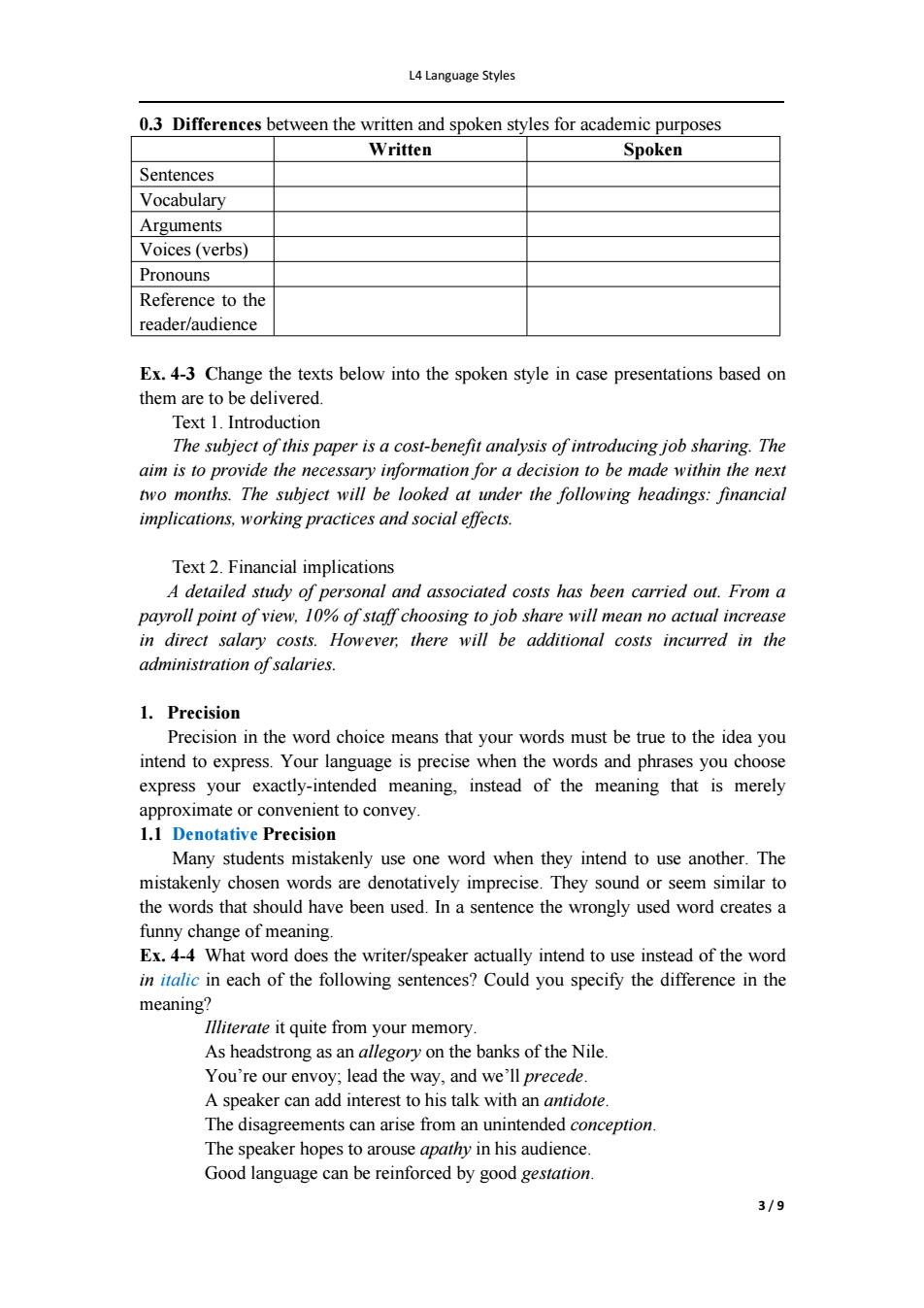
L4 Language Styles 0.3 Differences between the written and spoken styles for academic purposes Written Spoken Sentences Vocabulary Arguments Voices(verbs) Pronouns Reference to the reader/audience Ex.4-3 Change the texts below into the spoken style in case presentations based on them are to be delivered Text 1.Introduction The subject of this paper is a cost-benefit analysis of introducing job sharing.The aim is to provide the necessary information for a decision to be made within the next two months.The subject will be looked at under the following headings:financial implications,working practices and social effects. Text 2.Financial implications A detailed study of personal and associated costs has been carried out.From a payroll point of view,10%of staff choosing to job share will mean no actual increase in direct salary costs.However,there will be additional costs incurred in the administration of salaries. 1.Precision Precision in the word choice means that your words must be true to the idea you intend to express.Your language is precise when the words and phrases you choose express your exactly-intended meaning,instead of the meaning that is merely approximate or convenient to convey. 1.1 Denotative Precision Many students mistakenly use one word when they intend to use another.The mistakenly chosen words are denotatively imprecise.They sound or seem similar to the words that should have been used.In a sentence the wrongly used word creates a funny change of meaning. Ex.4-4 What word does the writer/speaker actually intend to use instead of the word in italic in each of the following sentences?Could you specify the difference in the meaning? Illiterate it quite from your memory. As headstrong as an allegory on the banks of the Nile You're our envoy;lead the way,and we'll precede. A speaker can add interest to his talk with an antidote. The disagreements can arise from an unintended conception. The speaker hopes to arouse apathy in his audience. Good language can be reinforced by good gestation. 3/9
L4 Language Styles 3 / 9 0.3 Differences between the written and spoken styles for academic purposes Written Spoken Sentences Vocabulary Arguments Voices (verbs) Pronouns Reference to the reader/audience Ex. 4-3 Change the texts below into the spoken style in case presentations based on them are to be delivered. Text 1. Introduction The subject of this paper is a cost-benefit analysis of introducing job sharing. The aim is to provide the necessary information for a decision to be made within the next two months. The subject will be looked at under the following headings: financial implications, working practices and social ef ects. Text 2. Financial implications A detailed study of personal and associated costs has been carried out. From a payroll point of view, 10% of staf choosing to job share will mean no actual increase in direct salary costs. However, there will be additional costs incurred in the administration of salaries. 1. Precision Precision in the word choice means that your words must be true to the idea you intend to express. Your language is precise when the words and phrases you choose express your exactly-intended meaning, instead of the meaning that is merely approximate or convenient to convey. 1.1 Denotative Precision Many students mistakenly use one word when they intend to use another. The mistakenly chosen words are denotatively imprecise. They sound or seem similar to the words that should have been used. In a sentence the wrongly used word creates a funny change of meaning. Ex. 4-4 What word does the writer/speaker actually intend to use instead of the word in italic in each of the following sentences? Could you specify the difference in the meaning? Illiterate it quite from your memory. As headstrong as an allegory on the banks of the Nile. You’re our envoy; lead the way, and we’ll precede. A speaker can add interest to his talk with an antidote. The disagreements can arise from an unintended conception. The speaker hopes to arouse apathy in his audience. Good language can be reinforced by good gestation
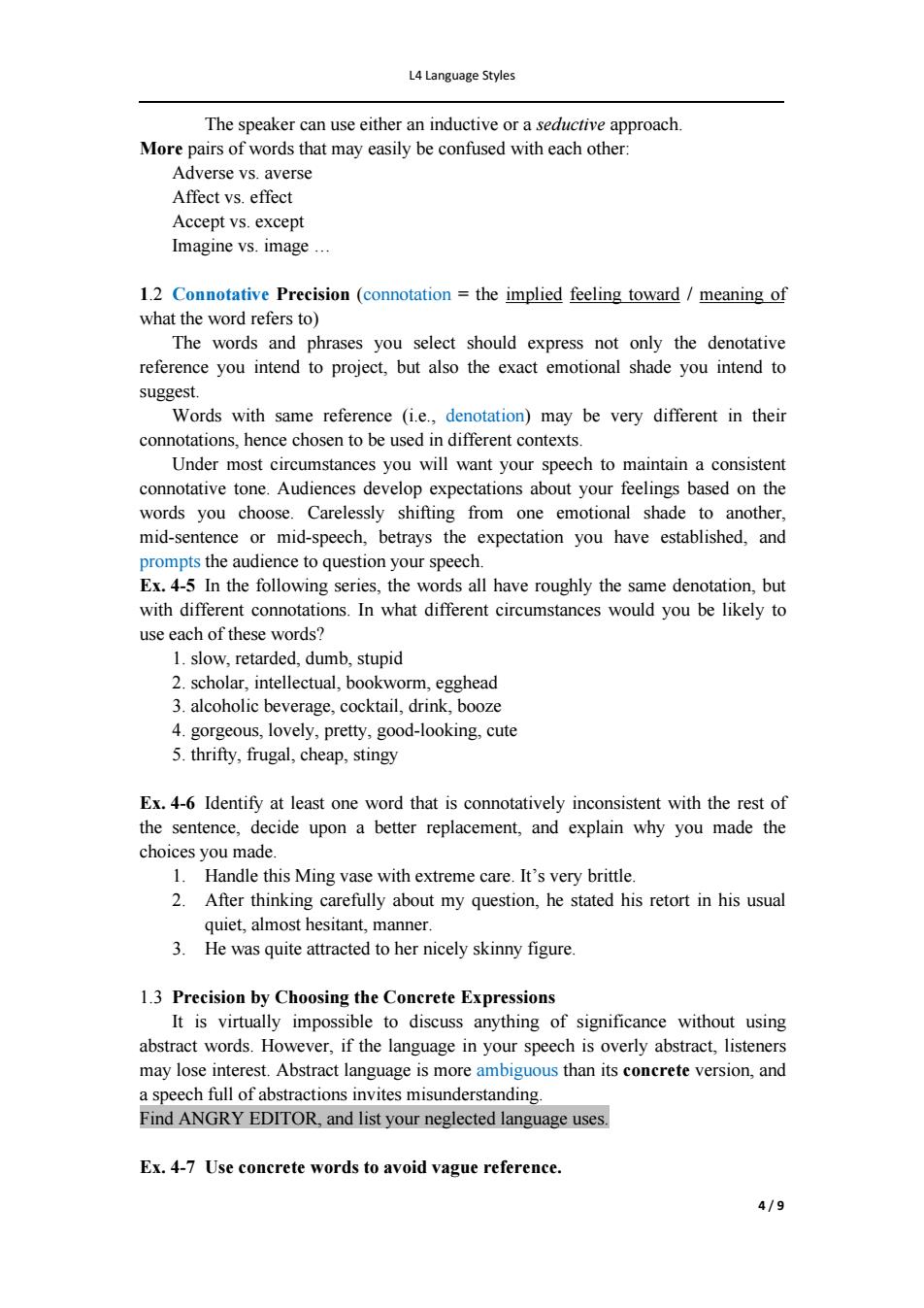
L4 Language Styles The speaker can use either an inductive or a seductive approach. More pairs of words that may easily be confused with each other: Adverse vs.averse Affect vs.effect Accept vs.except Imagine vs.image... 1.2 Connotative Precision (connotation the implied feeling toward meaning of what the word refers to) The words and phrases you select should express not only the denotative reference you intend to project,but also the exact emotional shade you intend to suggest. Words with same reference (i.e.,denotation)may be very different in their connotations,hence chosen to be used in different contexts. Under most circumstances you will want your speech to maintain a consistent connotative tone.Audiences develop expectations about your feelings based on the words you choose.Carelessly shifting from one emotional shade to another, mid-sentence or mid-speech,betrays the expectation you have established,and prompts the audience to question your speech. Ex.4-5 In the following series,the words all have roughly the same denotation,but with different connotations.In what different circumstances would you be likely to use each of these words? 1.slow,retarded,dumb,stupid 2.scholar,intellectual,bookworm,egghead 3.alcoholic beverage,cocktail,drink,booze 4.gorgeous,lovely,pretty,good-looking,cute 5.thrifty,frugal,cheap,stingy Ex.4-6 Identify at least one word that is connotatively inconsistent with the rest of the sentence,decide upon a better replacement,and explain why you made the choices you made. 1.Handle this Ming vase with extreme care.It's very brittle. 2.After thinking carefully about my question,he stated his retort in his usual quiet,almost hesitant,manner. 3.He was quite attracted to her nicely skinny figure. 1.3 Precision by Choosing the Concrete Expressions It is virtually impossible to discuss anything of significance without using abstract words.However,if the language in your speech is overly abstract,listeners may lose interest.Abstract language is more ambiguous than its concrete version,and a speech full of abstractions invites misunderstanding Find ANGRY EDITOR,and list your neglected language uses. Ex.4-7 Use concrete words to avoid vague reference. 4/9
L4 Language Styles 4 / 9 The speaker can use either an inductive or a seductive approach. More pairs of words that may easily be confused with each other: Adverse vs. averse Affect vs. effect Accept vs. except Imagine vs. image … 1.2 Connotative Precision (connotation = the implied feeling toward / meaning of what the word refers to) The words and phrases you select should express not only the denotative reference you intend to project, but also the exact emotional shade you intend to suggest. Words with same reference (i.e., denotation) may be very different in their connotations, hence chosen to be used in different contexts. Under most circumstances you will want your speech to maintain a consistent connotative tone. Audiences develop expectations about your feelings based on the words you choose. Carelessly shifting from one emotional shade to another, mid-sentence or mid-speech, betrays the expectation you have established, and prompts the audience to question your speech. Ex. 4-5 In the following series, the words all have roughly the same denotation, but with different connotations. In what different circumstances would you be likely to use each of these words? 1. slow, retarded, dumb, stupid 2. scholar, intellectual, bookworm, egghead 3. alcoholic beverage, cocktail, drink, booze 4. gorgeous, lovely, pretty, good-looking, cute 5. thrifty, frugal, cheap, stingy Ex. 4-6 Identify at least one word that is connotatively inconsistent with the rest of the sentence, decide upon a better replacement, and explain why you made the choices you made. 1. Handle this Ming vase with extreme care. It’s very brittle. 2. After thinking carefully about my question, he stated his retort in his usual quiet, almost hesitant, manner. 3. He was quite attracted to her nicely skinny figure. 1.3 Precision by Choosing the Concrete Expressions It is virtually impossible to discuss anything of significance without using abstract words. However, if the language in your speech is overly abstract, listeners may lose interest. Abstract language is more ambiguous than its concrete version, and a speech full of abstractions invites misunderstanding. Find ANGRY EDITOR, and list your neglected language uses. Ex. 4-7 Use concrete words to avoid vague reference
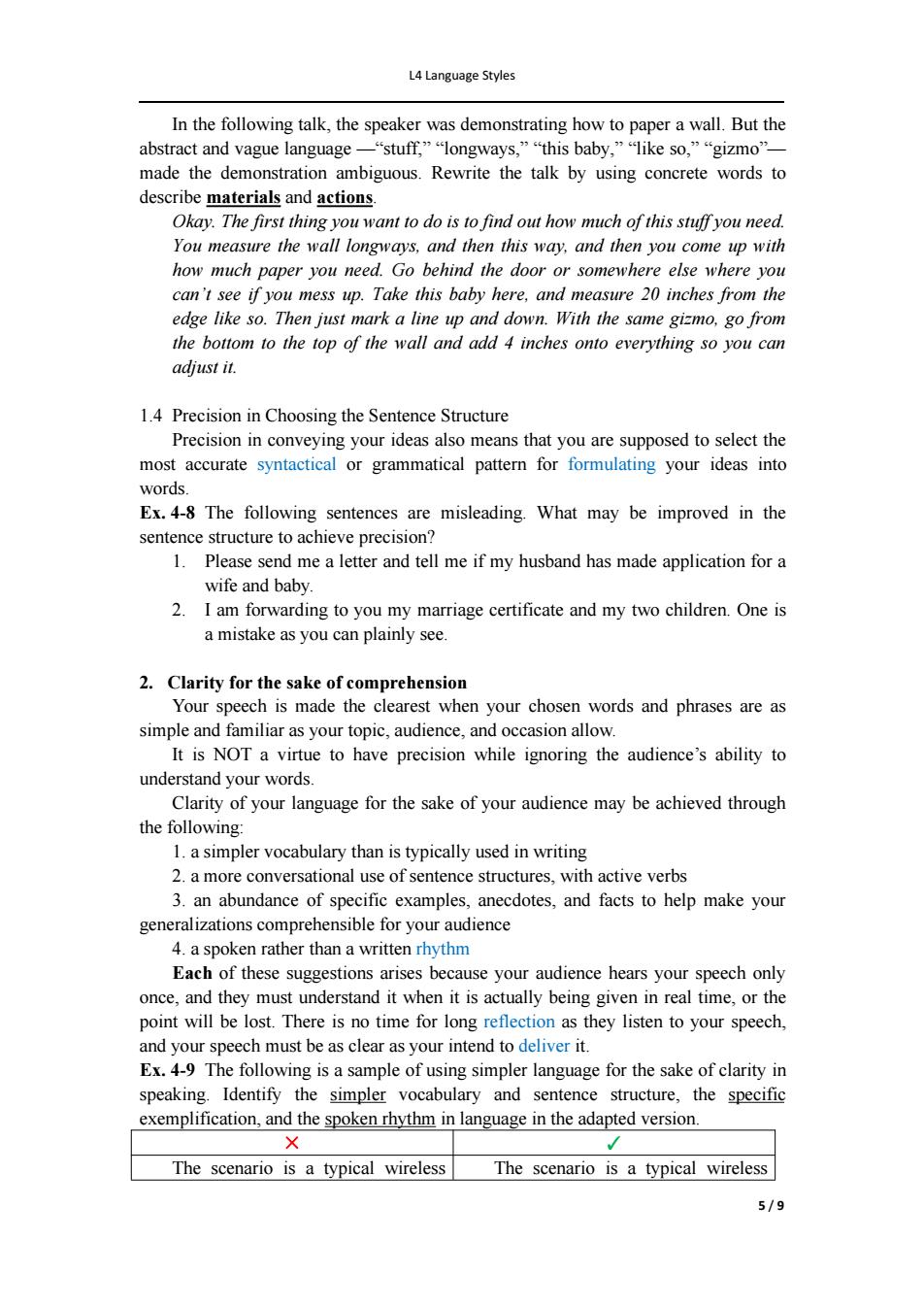
L4 Language Styles In the following talk,the speaker was demonstrating how to paper a wall.But the abstract and vague language-“stuff,.”“longways,”“this baby,"like so,”“gizmo'”- made the demonstration ambiguous.Rewrite the talk by using concrete words to describe materials and actions. Okay.The first thing you want to do is to find out how much of this stuffyou need. You measure the wall longways,and then this way,and then you come up with how much paper you need.Go behind the door or somewhere else where you can't see if you mess up.Take this baby here,and measure 20 inches from the edge like so.Then just mark a line up and down.With the same gizmo,go from the bottom to the top of the wall and add 4 inches onto everything so you can adjust it. 1.4 Precision in Choosing the Sentence Structure Precision in conveying your ideas also means that you are supposed to select the most accurate syntactical or grammatical pattern for formulating your ideas into words. Ex.4-8 The following sentences are misleading.What may be improved in the sentence structure to achieve precision? 1.Please send me a letter and tell me if my husband has made application for a wife and baby. 2.I am forwarding to you my marriage certificate and my two children.One is a mistake as you can plainly see. 2.Clarity for the sake of comprehension Your speech is made the clearest when your chosen words and phrases are as simple and familiar as your topic,audience,and occasion allow. It is NOT a virtue to have precision while ignoring the audience's ability to understand your words. Clarity of your language for the sake of your audience may be achieved through the following: 1.a simpler vocabulary than is typically used in writing 2.a more conversational use of sentence structures,with active verbs 3.an abundance of specific examples,anecdotes,and facts to help make your generalizations comprehensible for your audience 4.a spoken rather than a written rhythm Each of these suggestions arises because your audience hears your speech only once,and they must understand it when it is actually being given in real time,or the point will be lost.There is no time for long reflection as they listen to your speech, and your speech must be as clear as your intend to deliver it. Ex.4-9 The following is a sample of using simpler language for the sake of clarity in speaking.Identify the simpler vocabulary and sentence structure,the specific exemplification,and the spoken rhythm in language in the adapted version. X The scenario is a typical wireless The scenario is a typical wireless 5/9
L4 Language Styles 5 / 9 In the following talk, the speaker was demonstrating how to paper a wall. But the abstract and vague language —“stuff,” “longways,” “this baby,” “like so,” “gizmo”— made the demonstration ambiguous. Rewrite the talk by using concrete words to describe materials and actions. Okay. The first thing you want to do is to find out how much of this stuf you need. You measure the wall longways, and then this way, and then you come up with how much paper you need. Go behind the door or somewhere else where you can’t see if you mess up. Take this baby here, and measure 20 inches from the edge like so. Then just mark a line up and down. With the same gizmo, go from the bottom to the top of the wall and add 4 inches onto everything so you can adjust it. 1.4 Precision in Choosing the Sentence Structure Precision in conveying your ideas also means that you are supposed to select the most accurate syntactical or grammatical pattern for formulating your ideas into words. Ex. 4-8 The following sentences are misleading. What may be improved in the sentence structure to achieve precision? 1. Please send me a letter and tell me if my husband has made application for a wife and baby. 2. I am forwarding to you my marriage certificate and my two children. One is a mistake as you can plainly see. 2. Clarity for the sake of comprehension Your speech is made the clearest when your chosen words and phrases are as simple and familiar as your topic, audience, and occasion allow. It is NOT a virtue to have precision while ignoring the audience’s ability to understand your words. Clarity of your language for the sake of your audience may be achieved through the following: 1. a simpler vocabulary than is typically used in writing 2. a more conversational use of sentence structures, with active verbs 3. an abundance of specific examples, anecdotes, and facts to help make your generalizations comprehensible for your audience 4. a spoken rather than a written rhythm Each of these suggestions arises because your audience hears your speech only once, and they must understand it when it is actually being given in real time, or the point will be lost. There is no time for long reflection as they listen to your speech, and your speech must be as clear as your intend to deliver it. Ex. 4-9 The following is a sample of using simpler language for the sake of clarity in speaking. Identify the simpler vocabulary and sentence structure, the specific exemplification, and the spoken rhythm in language in the adapted version. × ✓ The scenario is a typical wireless The scenario is a typical wireless
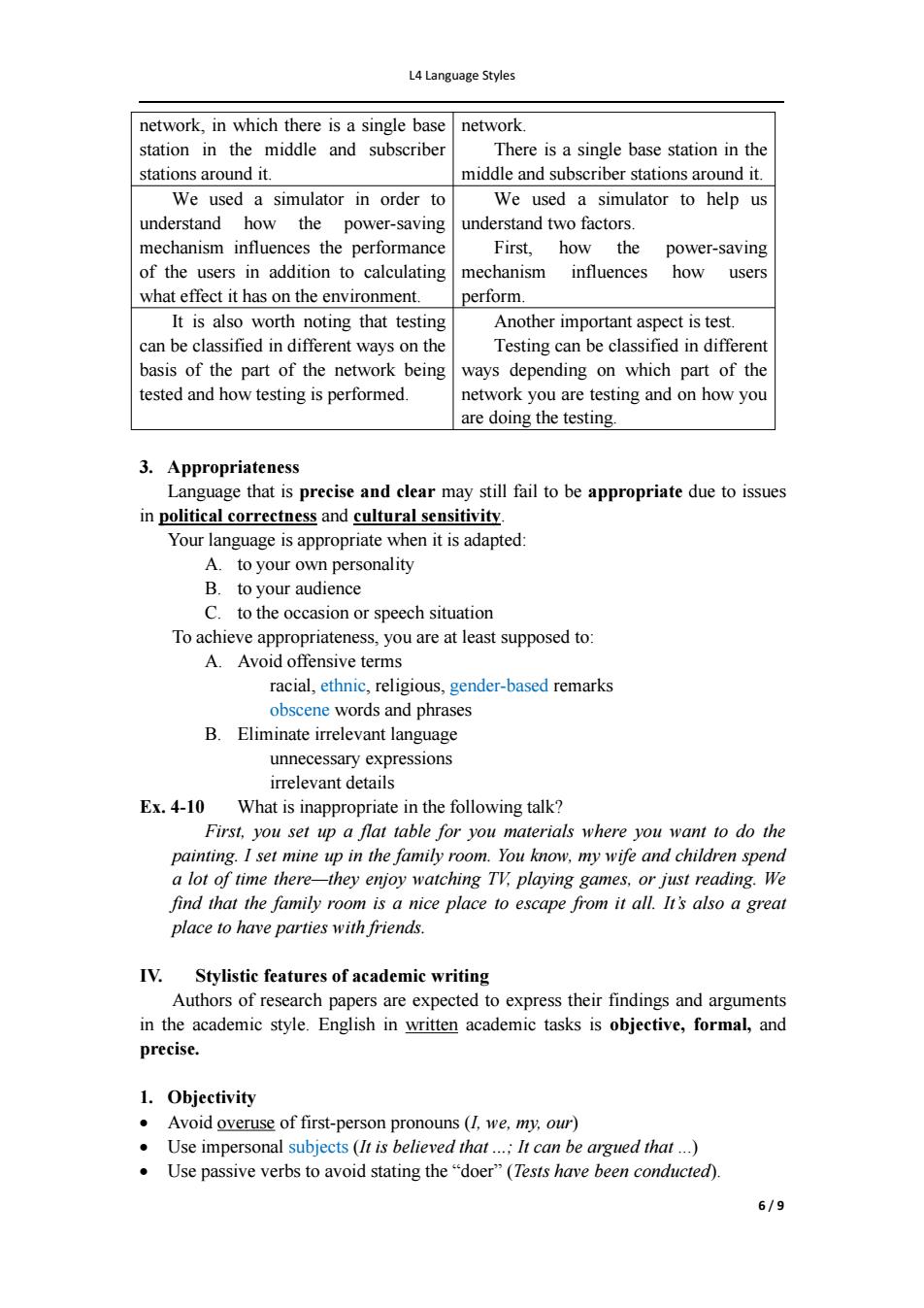
L4 Language Styles network,in which there is a single base network. station in the middle and subscriber There is a single base station in the stations around it. middle and subscriber stations around it. We used a simulator in order to We used a simulator to help us understand how the power-saving understand two factors. mechanism influences the performance First,how the power-saving of the users in addition to calculating mechanism influences how users what effect it has on the environment. perform. It is also worth noting that testing Another important aspect is test can be classified in different ways on the Testing can be classified in different basis of the part of the network being ways depending on which part of the tested and how testing is performed. network you are testing and on how you are doing the testing. 3.Appropriateness Language that is precise and clear may still fail to be appropriate due to issues in political correctness and cultural sensitivity. Your language is appropriate when it is adapted: A.to your own personality B.to your audience C.to the occasion or speech situation To achieve appropriateness,you are at least supposed to: A.Avoid offensive terms racial,ethnic,religious,gender-based remarks obscene words and phrases B.Eliminate irrelevant language unnecessary expressions irrelevant details Ex.4-10 What is inappropriate in the following talk? First,you set up a flat table for you materials where you want to do the painting.I set mine up in the family room.You know,my wife and children spend a lot of time there-they enjoy watching TV,playing games,or just reading.We find that the family room is a nice place to escape from it all.It's also a great place to have parties with friends. IV.Stylistic features of academic writing Authors of research papers are expected to express their findings and arguments in the academic style.English in written academic tasks is objective,formal,and precise. 1.Objectivity Avoid overuse of first-person pronouns (I,we,my,our) Use impersonal subjects (It is believed that...;It can be argued that...) Use passive verbs to avoid stating the"doer"(Tests have been conducted). 6/9
L4 Language Styles 6 / 9 network, in which there is a single base station in the middle and subscriber stations around it. network. There is a single base station in the middle and subscriber stations around it. We used a simulator in order to understand how the power-saving mechanism influences the performance of the users in addition to calculating what effect it has on the environment. We used a simulator to help us understand two factors. First, how the power-saving mechanism influences how users perform. It is also worth noting that testing can be classified in different ways on the basis of the part of the network being tested and how testing is performed. Another important aspect is test. Testing can be classified in different ways depending on which part of the network you are testing and on how you are doing the testing. 3. Appropriateness Language that is precise and clear may still fail to be appropriate due to issues in political correctness and cultural sensitivity. Your language is appropriate when it is adapted: A. to your own personality B. to your audience C. to the occasion or speech situation To achieve appropriateness, you are at least supposed to: A. Avoid offensive terms racial, ethnic, religious, gender-based remarks obscene words and phrases B. Eliminate irrelevant language unnecessary expressions irrelevant details Ex. 4-10 What is inappropriate in the following talk? First, you set up a flat table for you materials where you want to do the painting. I set mine up in the family room. You know, my wife and children spend a lot of time there—they enjoy watching TV, playing games, or just reading. We find that the family room is a nice place to escape from it all. It’s also a great place to have parties with friends. IV. Stylistic features of academic writing Authors of research papers are expected to express their findings and arguments in the academic style. English in written academic tasks is objective, formal, and precise. 1. Objectivity Avoid overuse of first-person pronouns (I, we, my, our) Use impersonal subjects (It is believed that ...; It can be argued that ...) Use passive verbs to avoid stating the “doer” (Tests have been conducted)
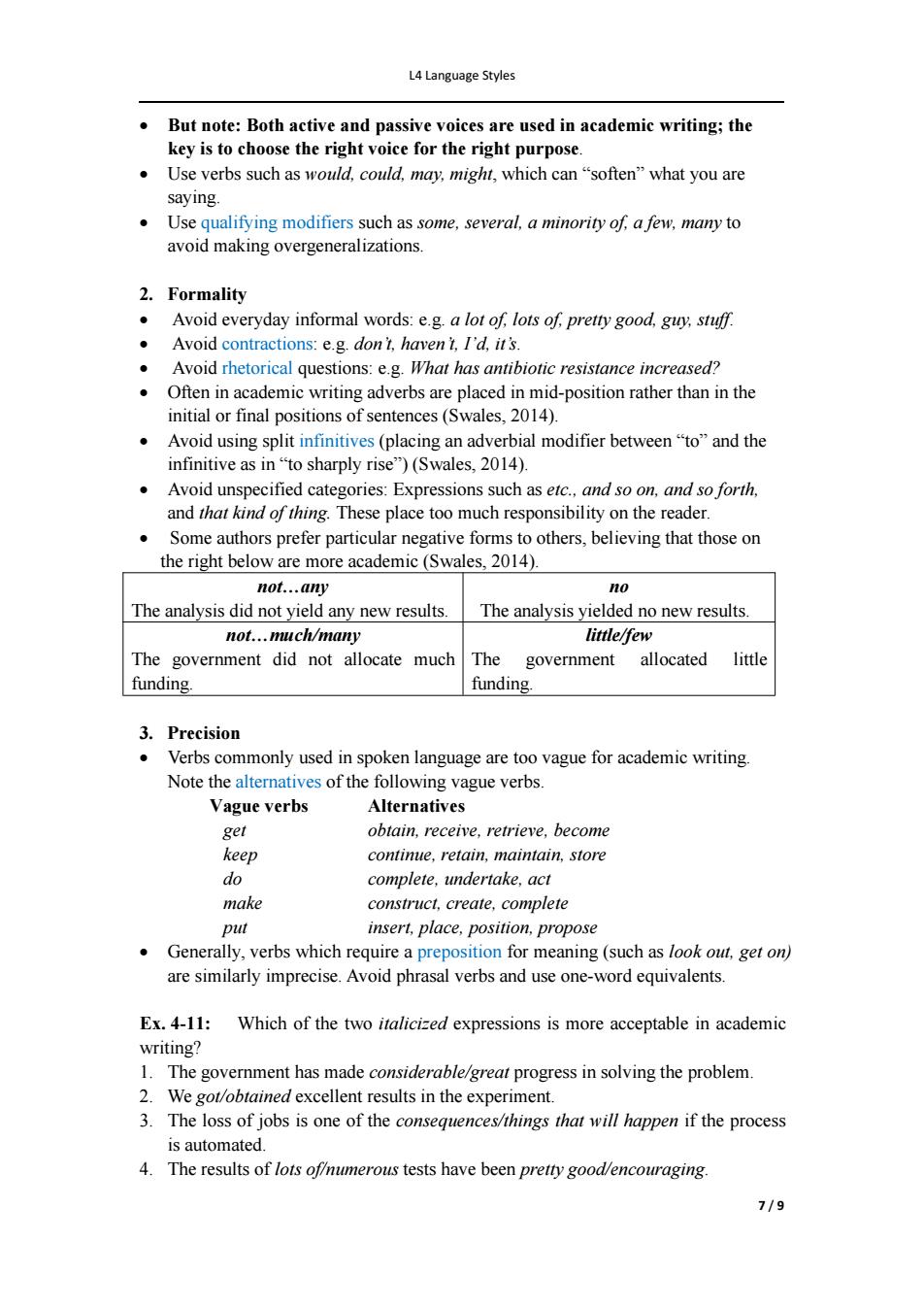
L4 Language Styles ● But note:Both active and passive voices are used in academic writing;the key is to choose the right voice for the right purpose Use verbs such as would,could,may,might,which can"soften"what you are saying. Use qualifying modifiers such as some,several,a minority of,a few,many to avoid making overgeneralizations. 2.Formality Avoid everyday informal words:e.g.a lot of,lots of,pretty good,guy,stuff. Avoid contractions:e.g.don't,haven t,I'd,it's. Avoid rhetorical questions:e.g.What has antibiotic resistance increased? Often in academic writing adverbs are placed in mid-position rather than in the initial or final positions of sentences(Swales,2014). ● Avoid using split infinitives(placing an adverbial modifier between"to"and the infinitive as in"to sharply rise")(Swales,2014). Avoid unspecified categories:Expressions such as etc.,and so on,and so forth, and that kind of thing.These place too much responsibility on the reader. Some authors prefer particular negative forms to others,believing that those on the right below are more academic(Swales,2014). not...any 10 The analysis did not yield any new results. The analysis yielded no new results. not...much/many little/few The government did not allocate much The government allocated little funding funding. 3.Precision Verbs commonly used in spoken language are too vague for academic writing. Note the alternatives of the following vague verbs. Vague verbs Alternatives get obtain,receive,retrieve,become keep continue,retain,maintain,store do complete,undertake,act make construct,create,complete put insert,place,position,propose Generally,verbs which require a preposition for meaning(such as look out,get on) are similarly imprecise.Avoid phrasal verbs and use one-word equivalents. Ex.4-11: Which of the two italicized expressions is more acceptable in academic writing? 1.The government has made considerable/great progress in solving the problem. 2.We got/obtained excellent results in the experiment. 3.The loss of jobs is one of the consequences/things that will happen if the process is automated. 4.The results of lots of/numerous tests have been pretty good/encouraging. 7/9
L4 Language Styles 7 / 9 But note: Both active and passive voices are used in academic writing; the key is to choose the right voice for the right purpose. Use verbs such as would, could, may, might, which can “soften” what you are saying. Use qualifying modifiers such as some, several, a minority of, a few, many to avoid making overgeneralizations. 2. Formality Avoid everyday informal words: e.g. a lot of, lots of, pretty good, guy, stuf . Avoid contractions: e.g. don’t, haven’t, I’d, it’s. Avoid rhetorical questions: e.g. What has antibiotic resistance increased? Often in academic writing adverbs are placed in mid-position rather than in the initial or final positions of sentences (Swales, 2014). Avoid using split infinitives (placing an adverbial modifier between “to” and the infinitive as in “to sharply rise”) (Swales, 2014). Avoid unspecified categories: Expressions such as etc., and so on, and so forth, and that kind of thing. These place too much responsibility on the reader. Some authors prefer particular negative forms to others, believing that those on the right below are more academic (Swales, 2014). not…any The analysis did not yield any new results. no The analysis yielded no new results. not…much/many The government did not allocate much funding. little/few The government allocated little funding. 3. Precision Verbs commonly used in spoken language are too vague for academic writing. Note the alternatives of the following vague verbs. Vague verbs Alternatives get obtain, receive, retrieve, become keep continue, retain, maintain, store do complete, undertake, act make construct, create, complete put insert, place, position, propose Generally, verbs which require a preposition for meaning (such as look out, get on) are similarly imprecise. Avoid phrasal verbs and use one-word equivalents. Ex. 4-11: Which of the two italicized expressions is more acceptable in academic writing? 1. The government has made considerable/great progress in solving the problem. 2. We got/obtained excellent results in the experiment. 3. The loss of jobs is one of the consequences/things that will happen if the process is automated. 4. The results of lots of/numerous tests have been pretty good/encouraging

L4 Language Styles 5.The relationship between the management and workers is extremely/really important. 6.Suggestions springing up from/arising from the study will be presented 7.Crash test dummies are really important for/an integral part of automotive crash tests. 8.According to a recent study,just about/nearly 25%of all cell phone users view text messaging as an important source of entertainment. Ex.4-12:Underline the phrasal verbs in the sentences and replace them with a verb from the list below.Change the verb form where necessary. fluctuate investigate eliminate raise reduce propose intervene determine 1.Researchers have been looking into the problem for 15 years. 2.This issue was brought up during the seminar._ 3.It is assumed that the management knows what is happening and will therefore step in if there is a problem. 4.Schools cannot altogether get rid of the problem of truancy 5.The number of staff has been cut down recently. 6.It was very difficult to find out exactly what happened. 7.House prices have a tendency to go up and down._ 8.A potential solution was put forward two years ago. Ex.4-13:Replace the phrasal verbs with a formal single verb 1.The locals could not put up with the visitors from the city. 2.The decline was brought about by cheap imports 3.The university is thinking about recruiting more students. 4.Sales are likely to drop off in the third quarter. 5.The meeting was put off until December. 6.Given our fast-paced society,people must routinely put creative solutions to unexpected problems into practice. 7.Some people have cut down on their consumption of beef. 8.The cinema was pulled down ten years ago. Ex.4-14:Use a formal word or phrase to replace the italicized. 1.The reaction of the officials was sort ofnegative. 2.The economic outlook is nice. 3.The new method we have adopted seems good. 4.She was given the sack because of her poor record. 5.The competition we are facing has gotten more intense. 6.Many urban areas do not have enough land to build new public schools. 7.Allergic reactions to local dental anesthesia do not happen very often. 8.The doors on these ferries were made bigger to make it easier to load vehicles. 8/9
L4 Language Styles 8 / 9 5. The relationship between the management and workers is extremely/really important. 6. Suggestions springing up from/arising from the study will be presented. 7. Crash test dummies are really important for/an integral part of automotive crash tests. 8. According to a recent study, just about/nearly 25% of all cell phone users view text messaging as an important source of entertainment. Ex. 4-12: Underline the phrasal verbs in the sentences and replace them with a verb from the list below. Change the verb form where necessary. fluctuate investigate eliminate raise reduce propose intervene determine 1. Researchers have been looking into the problem for 15 years. 2. This issue was brought up during the seminar. 3. It is assumed that the management knows what is happening and will therefore step in if there is a problem. 4. Schools cannot altogether get rid of the problem of truancy. 5. The number of staff has been cut down recently. 6. It was very difficult to find out exactly what happened. 7. House prices have a tendency to go up and down. 8. A potential solution was put forward two years ago. Ex. 4-13: Replace the phrasal verbs with a formal single verb. 1. The locals could not put up with the visitors from the city. 2. The decline was brought about by cheap imports. 3. The university is thinking about recruiting more students. 4. Sales are likely to drop off in the third quarter. 5. The meeting was put off until December. 6. Given our fast-paced society, people must routinely put creative solutions to unexpected problems into practice. 7. Some people have cut down on their consumption of beef. 8. The cinema was pulled down ten years ago. Ex. 4-14: Use a formal word or phrase to replace the italicized. 1. The reaction of the officials was sort of negative. _______________________ 2. The economic outlook is nice. ______________________ 3. The new method we have adopted seems good._________________ 4. She was given the sack because of her poor record. __________________ 5. The competition we are facing has gotten more intense. _________________ 6. Many urban areas do not have enough land to build new public schools. ___________ 7. Allergic reactions to local dental anesthesia do not happen very often. ___________ 8. The doors on these ferries were made bigger to make it easier to load vehicles. __________

L4 Language Styles Ex.4-15:Follow the considerations above.What problems may the following sentences have?How would you revise them? 1.You can use this model to optimize the water supply. 2.So,why did the bridge collapse?There're a lot of reasons. 3.In addition to herbs,animal products are employed in some forms of traditional medicine frequently. 4.So far there hasn't been much research on how conflict influences the level of trust and respect in a group. 5.There are several studies in epidemiology that have shown that when people consume alcohol in moderate amounts they have a lower risk of developing heart disease in comparison to those people who drink a lot of alcohol. Assignments: 1.Finish Ex.4-11 to Ex.4-14,and be able to justify your answers;mark your doubts so that you can put them forward in the classroom discussion in L5.You may find extra exercises in Unit One of Swales'Academic Writing for Graduate Students,for example,Task 11 and Task 12. 2.Review your language use in starter presentation performance,refer to precision, clarity,and appropriateness in language,and in particular improve your word and sentence structure choices.Teamwork to evaluate each other's performance in the presentation,and optimize your own goals accordingly for presentation practice in the semester. 3.Team research on the high-frequency expressions in data commentary in your top journals,and be ready to share your findings (with evidence)with the class.You may or may not find a new team for this,and tools for language statistics may turn out to be helpful, such as http://www.adelaide.edu.au/carst/resources-tools/adtat/. 4.You are supposed to deal with language issues in the Lesson 5 students'handout before the Lesson 5 week. 9/9
L4 Language Styles 9 / 9 Ex. 4-15: Follow the considerations above. What problems may the following sentences have? How would you revise them? 1. You can use this model to optimize the water supply. 2. So, why did the bridge collapse? There’re a lot of reasons. 3. In addition to herbs, animal products are employed in some forms of traditional medicine frequently. 4. So far there hasn’t been much research on how conflict influences the level of trust and respect in a group. 5. There are several studies in epidemiology that have shown that when people consume alcohol in moderate amounts they have a lower risk of developing heart disease in comparison to those people who drink a lot of alcohol. Assignments: 1. Finish Ex. 4-11 to Ex. 4-14, and be able to justify your answers; mark your doubts so that you can put them forward in the classroom discussion in L5. You may find extra exercises in Unit One of Swales’ Academic Writing for Graduate Students, for example, Task 11 and Task 12. 2. Review your language use in starter presentation performance, refer to precision, clarity, and appropriateness in language, and in particular improve your word and sentence structure choices. Teamwork to evaluate each other’s performance in the presentation, and optimize your own goals accordingly for presentation practice in the semester. 3. Team research on the high-frequency expressions in data commentary in your top journals, and be ready to share your findings (with evidence) with the class. You may or may not find a new team for this, and tools for language statistics may turn out to be helpful, such as http://www.adelaide.edu.au/carst/resources-tools/adtat/. 4. You are supposed to deal with language issues in the Lesson 5 students’ handout before the Lesson 5 week